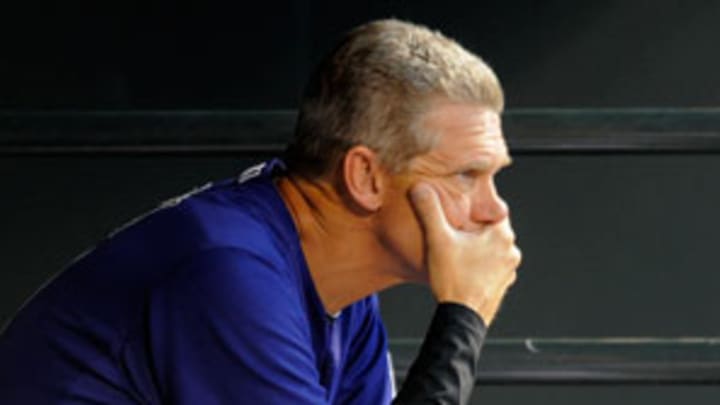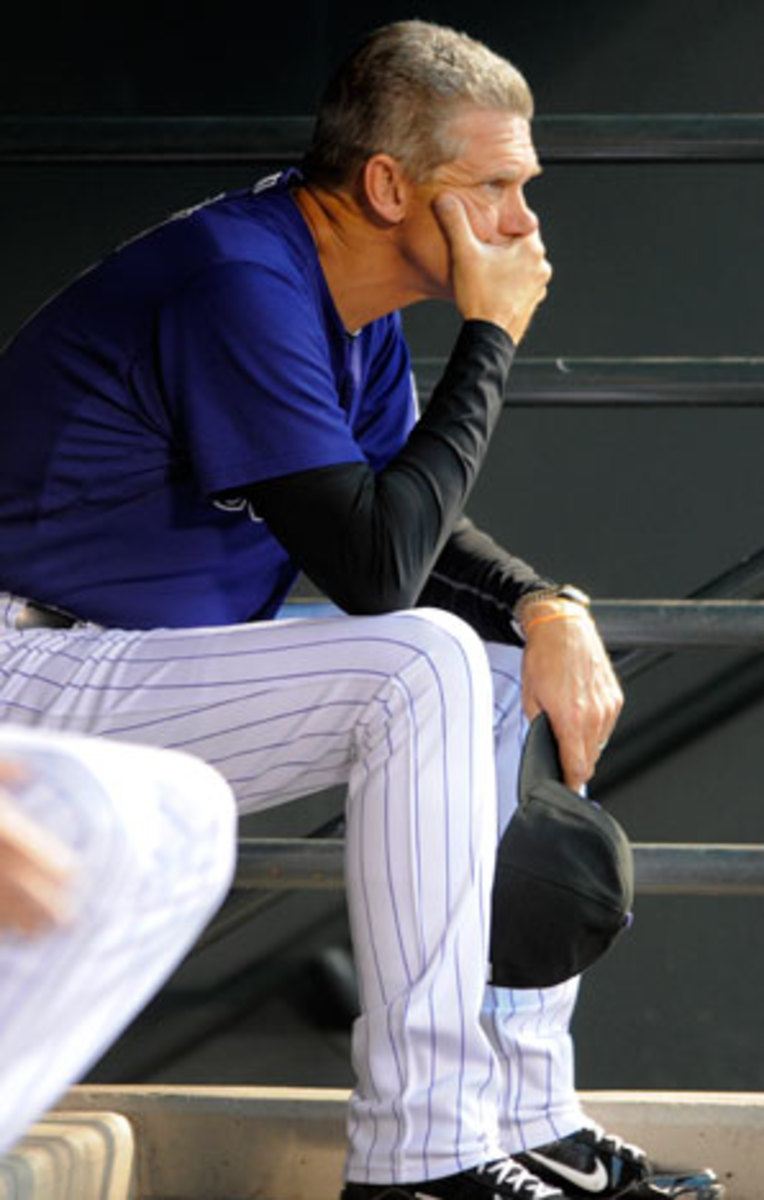Tracy walks away as Rockies manager

Jim Tracy is out as Rockies manager after three-plus seasons in Colorado. (AP)

Back in February, the Rockies and manager Jim Tracy announced that they had a "handshake agreement" for Tracy to continue managing the team for as long as he desired, with the two sides planning to re-evaluate the situation at the end of every season. But after discussions with Rockies executives on the heels of a franchise-worst 64-98 record, Tracy has resigned his post. Among the 30 managers who began the season, he's the fourth to depart, with the Astros' Brad Mills, the Indians' Manny Acta and the Red Sox' Bobby Valentine all fired late in the season or at its end. It's difficult to blame Tracy for departing, given the current shape of the Rockies' front office, but at the same time, it's tough to ignore the diminishing returns on his watch.
Tracy spent three-plus seasons at the helm of the Rockies, but he could never match the success of his partial first season. In late May 2009, he took over an 18-28 team from the fired Clint Hurdle, whom he had served as bench coach. The Rockies went 74-42 the rest of the way — the best record in the league by 6 1/2 games — and captured their second NL wild-card berth in three years, with Tracy winning NL Manager of the Year honors. With a lineup built around Troy Tulowitzki, Carlos Gonzalez, Dexter Fowler, Chris Iannetta and Ian Stewart, and a rotation anchored by Ubaldo Jimenez — all 26 or younger — the Rockies boasted the best collection of young talent in the division at that point. Alas, after contending via an 82-66 record into late September the following year, they lost 13 of their final 14 games, many due to Tracy's bullpen mismanagement, and dipped to 73 and then 64 wins in his final two seasons.
Colorado's slide hasn't been all Tracy's doing. Last year, it was the sudden decline of Jimenez, who was finally shipped off to Cleveland at the trade deadline, coupled with the loss of Jorge de la Rosa to Tommy John surgery. This year, Tracy had to deal with a handful of major injuries to his lineup, none bigger than the groin strain that limited Tulowitzki to 47 games and required surgery in late June. Todd Helton played in just 69 games and ended his season in early August due to a torn hip labrum, while Michael Cuddyer played in just three games after July 31 due to a an oblique strain.But the larger problem is that general manager Dan O'Dowd and company seem to have forgotten the recipe for success that helped the Rockies overcome their high-altitude environment. From 2007-2009, their pitching staff ranked in the top three in the majors in groundball rate, the better to keep balls from leaving Coors Field, but in trading Jimenez and Jason Hammel, and acquiring flyballers such as Jeremy Guthrie, Josh Outman and Guillermo Moscoso, they fell to 17th in the majors in that category, and as a result, their their run prevention and home run rates (5.49 per game, and 1.3 per nine) were their worst since 2004, not to mention the worst in the league.
At the center of that abysmal showing was a controversial decision to experiment with a four-man rotation, with each pitcher constrained by a 75-pitch limit. At the time the Rockies invoked the experiment in late June, their starters had been battered for a 6.28 ERA and averaged just 5.2 innings per start. Their performance improved, but only to a 5.44 ERA; their walk and homer rates remained way too high for any real success. It didn't help that injuries befell Jhoulys Chacin and Juan Nicasio, or that de la Rosa took longer than expected to return from June 2011 Tommy John surgery; that trio combined for just 28 starts. The unreadiness of rookies Drew Pomeranz, Alex White and Christian Friedrich was glaringly apparent, and experiments with retreads Jeff Francis and Jamie Moyer met with predictably poor results.
As of late August, the Rockies planned to continue the experiment next year, but by mid-September, they decided to reverse course. Next year, they'll use a five-man rotation, again on a pitch count (90 to 100), with three "hybrid relievers" again working on a set schedule for around 50 pitches, entering games once a pitcher gets into the third time through the batting order. While Tracy was said to have gained comfort with the strategy as the season progressed, the results had to be disheartening. The promotion of assistant general manager Bill Geivett to director of major league operations, making him the de facto co-GM alongside O'Dowd — with a desk 20 feet away from Tracy's office, the better to oversee the pitching experiment — may have been viewed by the manager as an encroachment on his turf. The talks with Geivett that preceded Tracy's departure may have centered around his desire to decide how to run his rotation.
Tracy wasn't entirely blameless for the Rockies' downfall, though. Time and again, he has shown preference for veterans over well-regarded young players, with Miguel Olivo and Yorvit Torrealba essentially running Iannetta out of town, and Garrett Atkins and Melvin Mora cutting into Stewart's time; he held the switch-hitting Fowler back from full-time duty as well, starting him no more than 119 times in any of four full seasons. He failed to maximize his usage of his best relievers, with his teams consistently falling a few wins below the NL average when it came to maintaining late-inning leads.
Wilin Rosario
Josh Rutledge
Jordan Pacheco
